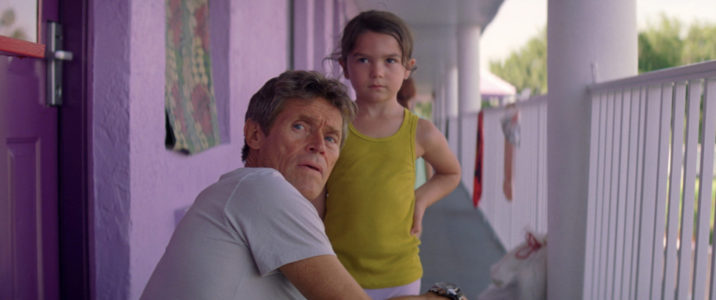A tremendous challenge in numerous professions, film criticism least of all, is approaching one’s work with nuance. As a critic, I can break down for you, the reader, what the themes and motifs of a given movie are, but that doesn’t necessarily mean I’ve effectively conveyed the efficacy of a film in expressing these traits. Rarer still is finding a film that has clear cinematic antecedents yet occupies a particular space and time to recognize deep-rooted concerns that affect our reality existing beyond its own parameters. And that is where I find myself talking about The Florida Project, a full-throated condemnation of the oblivion begat by consumerism populated by a cast of characters who feel as vivid as any documentary subject. But aesthetically, the film playfully teeters between realism and saturated Disneyesque parable without betraying its own convictions. It is subjectively rooted in a keen, pointed, and vital understanding of how too many Americans struggle to survive in a pastel-colored nightmare.
Nestled within a strip mall along a stretch of highway in Orlando is The Magic Castle. One of several motels dotting the horizon, the mauve-tinted edifice is the home of a seven-year old girl named Moonee (Brooklyn Prince) and her mother Halley (Bria Vinaite). She and her friends spend the summer running unsupervised through their makeshift dominion. The obstreperous ringleader makes friends with a girl named Jahncie (“What kind of name is that?!”, proclaims a child named Scooty) living at a neighboring motel after she and her friends rain spit on the car of the girl’s poor guardian. Their adventures are documented by the director Sean Baker and his DP Alexis Zabe with what can be only described in paradoxical terms as vivacious restraint. Their camera often observes the children romping along a lateral plane past gift shops and restaurants as they chatter over each other. A remarkable single take captured with a telephoto lens tracks the kids running the expanse of the motel. With gentle simplicity, Baker and Zabe portray the dual nature of grandiose smallness that is the world of these children.

Indeed, the familiar faces of the Magic Castle are afforded a stature that is simultaneously banal and indelible, none more notable than the manager, Bobby. He is played by the most recognizable face in the cast, Willem Dafoe. As an actor, Dafoe has become synonymous with playing lecherous villains, but he has never been as sympathetic as he is in The Florida Project. A history of unspoken regret is briefly alluded to in scenes with his son Jack (Caleb Landry Jones, who has had a stupendous year), yet his emotional history is conveyed primarily through Dafoe’s recognizable mien. Those pronounced cheekbones and the occasional toothy smile convey years of weary stewardship over his own makeshift domain. In his own, humble way, Bobby is one of the most heroic characters of any American film this year, a perfectly ordinary man whose wellsprings of compassion make him a figure of decency amidst a sea of desperation.
That desperation slowly seizes control of Moonee’s world as the dire circumstances of her life with her mother become readily apparent to the audience. The young mother’s belligerent impudence masks a defensive rage that is not merely exacerbated by her social conditioning but, the film argues, a direct consequence of it. The relationships and exchanges between the adults, in stark contrast to their children, are predicated upon stringently varying degrees of power. Consider a scene where Halley clashes with the mother of Scooty forbids her son from colluding with Moonee (and not for lack of a good reason). By humiliating this woman at her workplace, Halley both indulges in her anger at the perceived slight against her kin but just as importantly fulfills a fundamental role within the binary structure of Capitalism. Indeed, the pervasive visual and aural recurrence of helicopters signify ironically conflicting meanings. As objects of both authority and freedom, loathing and desire, they are just one part of the cultural mosaic of consumerism.

Thematically, Baker’s film, from a script he wrote with Chris Bergoch, engages in a discourse with many American films that have recently focused on the failures of the American hegemony to aid the discarded, the social outcasts. But like Moonlight and American Honey, the film balances it’s cinematic influences fluidly. Several moments where nature interpolates into the world of these characters are shot with a floating steadicam reminiscent of Terrence Malick. Even a scene of mother and daughter playing in the rain is marked with elliptical editing which specifically recalls The Tree of Life. But Baker incorporates these influences to reinforce the subjective lens of childlike yearning that is both politicized and humanized in The Florida Project. Our environments are as much borne from the resources we have at our disposal as they are formed by external forces. The film understands this particular truth and captures it to beguiling and ultimately devastating effect.

But what makes The Florida Project ultimately so moving is how it makes us, as an audience, feel privileged to observe the lives of it’s characters. It pinpoints the chief allure of escapism in childhood and builds upon that to savagely attack those who have commodified such a common component of humanity. And our hearts break for the people struggling mightily just to survive, let alone foster and cultivate unmarketable qualities like social responsibility and communion. By organically expressing unforced joy and decrying any form of sentimentality or condescension, The Florida Project is determined to demonstrate the desire to live in those who are expected solely to buy. On all counts, it is a humbling success and one of the year’s very best films.
